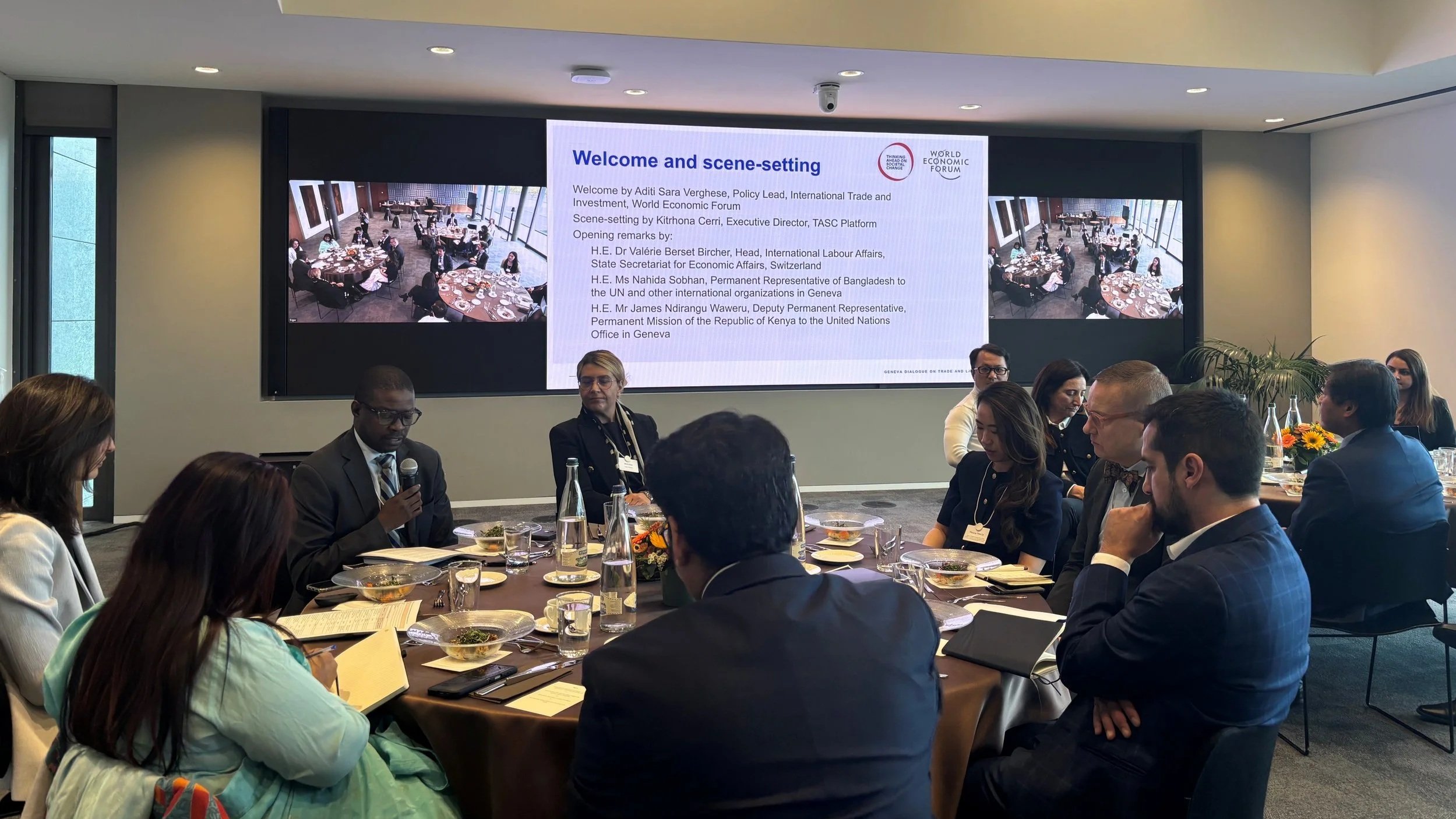Inclusive Trade and Labour Transitions: A Country Perspective from Kenya
During the Geneva Dialogue on Trade and Labor (October 2025) and hosted by the TASC Platform and the World Economic Forum Trade and Investment Team, H.E. Ambassador James Ndirangu Waweru, Deputy Permanent Representative, Permanent Mission of the Republic of Kenya to the United Nations Office in Geneva, spoke to the urgency of aligning trade and labour agendas in the context of Africa’s fast-evolving economic transitions. As geo-economic shifts and accelerating digital transitions reshape global supply chains and labour markets, he underscored the need to ensure that structural transformation delivers more than just growth and must lead to meaningful jobs, inclusion, and resilience.
The Geneva Dialogue on Trade and Labour forms part of the broader Trade and Labour Programme, a joint initiative of the TASC Platform and the World Economic Foundation, supported by the Laudes Foundation.
In a time of profound transformation, we must take a moment to reflect on the critical crossroads we face. Workers everywhere are at risk of being left behind as our economies navigate these turbulent waters.
“ It is our collective responsibility to ensure that the future of work is inclusive, equitable, and sustainable. ”
In recent years, we have witnessed dramatic changes in global trade dynamics. Political tensions, shifting alliances, and the urgent need for environmental sustainability are reshaping how we think about trade. In parallel, the digital revolution is altering the landscape of labor. Automation, artificial intelligence, and the rise of remote work are transforming the nature of jobs and the skills required to succeed in the modern economy.
As we embrace these changes, we must not lose sight of the human element at the heart of our economies. Governments around the world are recognizing the urgency of supporting the creation of high-quality jobs. High-quality jobs are those that provide fair wages, safe working conditions, and opportunities for growth. They are the backbone of sustainable development and the key to unlocking prosperity for all. Investment in high-quality jobs is not just a goal. It is a necessity.
Trade, investment, and employment policies are interconnected and play vital roles in improving outcomes for workers in global supply chains. We must align these policies to create a cohesive framework that prioritizes both economic and social objectives.
“The discussions we engage in today are not merely academic. They have real-world implications for millions of workers, families, and communities. Our policies must reflect this urgency, ensuring that workers benefit from the opportunities created by trade.”
In Geneva, we are fortunate to have platforms that brings together experts in trade, labor, digital innovation, and environmental sustainability such as yourselves. As we exchange views on current initiatives and developments, let us assess the gaps that exist in research, policy, and action.
What can we learn from one another?
How can we leverage our collective expertise to build a better future?
The challenges we face are daunting, but they also present us with unique opportunities.
The green transition is not just an environmental imperative; it is an economic opportunity. The shift towards renewable energy, sustainable agriculture, and green technologies can create millions of new jobs. However, we must ensure that these jobs are accessible to all, particularly those who have historically been marginalized in the labor market.
Similarly, the digital transition offers immense potential for innovation and growth. Yet, we must be vigilant in addressing the risks that come with it. The digital divide threatens to exacerbate existing inequalities.
“As we embrace technology, we must prioritize digital literacy and access to ensure that no worker is left behind in this new economy. ”
Education and training must be at the forefront of our initiatives. We cannot afford to let anyone fall through the cracks.
In conclusion, as we navigate our current realities, let us remain steadfast in our commitment to inclusivity and equity in trade and labor. Together, we can forge a path that uplifts workers, strengthens communities, and fosters sustainable growth.
“As stakeholders, let us work together to shape a future where trade empowers labor - where every worker has the opportunity to thrive in this changing world - where workers are not just participants but are key architects of their futures, decent futures.”
The road ahead might seem tough, but with collaboration and unwavering determination, we can ensure that no one is left behind.
The Trade and Labour Programme convenes stakeholders across trade, labour, and development to examine how economic transitions can deliver more just and inclusive outcomes. Through deep fieldwork, multistakeholder dialogue, and policy engagement, the programme is building momentum for a global trade system that is socially responsive, economically resilient, and fit for the future of work, and the future of working together.
📬 Interested in joining this dialogue? Get in touch with us.




